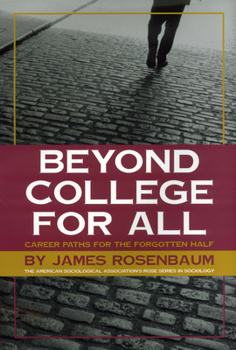Beyond College for All: Career Paths for the Forgotten Half
Select Format
Select Condition 
Book Overview
In a Society where everyone is supposed to go to college, the problems facing high school graduates who do not continue their education are often forgotten. Many cannot find jobs, and those who do are... This description may be from another edition of this product.
Format:Paperback
Language:English
ISBN:0871547538
ISBN13:9780871547538
Release Date:December 2004
Publisher:Russell Sage Foundation
Length:335 Pages
Weight:1.15 lbs.
Dimensions:1.0" x 6.6" x 9.0"
Customer Reviews
1 rating
Transforming the American Dream into Reality
Published by Thriftbooks.com User , 21 years ago
America is called the Land of Opportunity because people of all backgrounds are given a chance at advancement through education and hard work, but these opportunities are not available to all students.Professor Rosenbaum has studied the educational opportunities given to students of low SES (socio-economic status) backgrounds for over 35 years. In this book, he evaluates the adequacy and extent of American vocational education programs and compares them with successful models in other countries such as Japan and Germany. In this analysis, he points out a tragic irony: due to their egalitarian ideals, American schools are uncomfortable with creating a substantial vocational education system and instead offer a college preparatory curriculum to nearly all students, a choice which ends up depriving students of the means to earn a good living. The American educational system sends the signal to students that they ought attend college: in surveys, most students say that they plan to attend college. At the same time, students have little idea what colleges require: as Prof Rosenbaum's _Making Inequality_ (1976) showed, students were ignorant of basic college application processes. Students do know that community colleges are open to all and perceive that grades don't matter, giving them little incentive to study. Even non-college-bound students also know that employers don't look at high school grades, and so have little incentive to study.After high school graduation, students enter community colleges ill-prepared for the courses; most students must enroll in remedial courses, which they're paying for, but do not earn college credits. Disappointed with this process, high numbers of students drop out with few or no college credits. By contrast, in good vocational education programs, students have incentives to do well: teachers develop relationships with employers, who trust their opinions of students, and students see that their performance in the classroom has a direct effect on their employability. In addition, the voc ed curriculum is clearly relevant to the real world, and students gain self-esteem from learning real world job skills such as auto mechanics or computer assembly; making a device work is a clear source of motivation, unlike algebra. Students in vocational education programs also attain higher levels of competence at the same skills than they would in college preparatory courses. Cognitive psychology studies show that students are often better at solving real-world problems than abstract ones: uneducated Brazilian street children selling fruit on the street are capable of solving complex arithmetic problems, but unable to solve the same problems when phrased in abstract terms. In sum, the American educational system perpetuates a false egalitarianism through its failure to offer more substantial vocational education programs. Rather than stigmatizing students, vocational education programs empower them to gain comp





